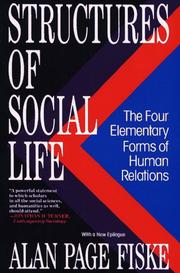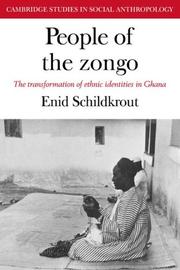| Listing 1 - 3 of 3 |
Sort by
|
Book
ISBN: 1282710931 9786612710933 9956578002 995661677X 9956616672 9789956578009 9789956616671 9789956616558 9956616559 Year: 2010 Publisher: Cameroon : Langaa RPCIG,
Abstract | Keywords | Export | Availability | Bookmark
 Loading...
Loading...Choose an application
- Reference Manager
- EndNote
- RefWorks (Direct export to RefWorks)
The Moogo, the region of the Moose--known as "Mossi" in ancient literature--occupies the entire central zone of Burkina Faso. It is divided into several kingdoms, the principal one comprising today's capital of Ouagadougou. Along with the singing griots, the evening storytellers pass on the ancestral word during the evening gatherings where they provide the group with models to follow. The folktale is the most appropriate form for teaching young children to express themselves, to structure their thoughts, and to reason. The tales portraying familiar animals will be reserved for the group of youngest children. The legendary gluttony and foolishness of Mba-Katre, the hyena, in contrast with the cunning and finesse of Mba-Soamba, the hare, will interest above all children from 10-12 years of age. The stories describing the origin of things, the reason for various social taboos, the legitimacy of social functions and structures, as well character flaws that need correcting, are reserved as a priority for adolescents
Legends --- Tales --- Mossi (African people) --- Moaaga (African people) --- Mole (African people) --- Mooré (African people) --- Moose (African people) --- Moré (African people) --- Moshi (African people) --- Mosi (African people) --- Mossé (African people) --- Ethnology --- Folk tales --- Traditions --- Urban legends --- Folklore --- Fairy tales --- Fairytales --- Children's stories --- Folk beliefs --- Folk-lore --- Manners and customs --- Material culture --- Mythology --- Oral tradition --- Storytelling

ISBN: 0029066875 Year: 1993 Publisher: New York Free Press
Abstract | Keywords | Export | Availability | Bookmark
 Loading...
Loading...Choose an application
- Reference Manager
- EndNote
- RefWorks (Direct export to RefWorks)
Communities --- Equality --- Ethnology --- Exchange theory (Sociology) --- Interpersonal relations --- Mossi (African people) --- Social interaction --- Social status --- Value --- 316 --- Standard of value --- Cost --- Economics --- Exchange --- Wealth --- Prices --- Supply and demand --- Social standing --- Socio-economic status --- Socioeconomic status --- Standing, Social --- Status, Social --- Power (Social sciences) --- Prestige --- Human interaction --- Interaction, Social --- Symbolic interaction --- Psychology --- Social psychology --- Human relations --- Interpersonal relationships --- Personal relations --- Relations, Interpersonal --- Relationships, Interpersonal --- Social behavior --- Object relations (Psychoanalysis) --- Sociology --- Egalitarianism --- Inequality --- Social equality --- Social inequality --- Political science --- Democracy --- Liberty --- Moaaga (African people) --- Mole (African people) --- Mooré (African people) --- Moose (African people) --- Moré (African people) --- Moshi (African people) --- Mosi (African people) --- Mossé (African people) --- Community --- Social groups --- 316 Sociologie --(algemeen) --- Sociologie --(algemeen) --- Social life and customs --- Moaga (African people)

ISBN: 0521214831 0521040531 0511557620 Year: 1978 Publisher: Cambridge : Cambridge University Press,
Abstract | Keywords | Export | Availability | Bookmark
 Loading...
Loading...Choose an application
- Reference Manager
- EndNote
- RefWorks (Direct export to RefWorks)
Dr Schildkrout probes questions of ethnicity, religion, cultural change and the African national identity in this study of the immigrant community of Kumasi, Ghana's second largest city. She compares first- and second-generation immigrants - those born in their rural homelands, and those born in Ghana - in terms of their orientation to politics, to kinship, and to community participation. The author explores the meaning of ethnic identity for rural- and urban-born immigrants, and establishes certain generalizations about ethnicity based on these comparisons. The book discusses the issues of migration, particularly interregional migration; the position of the 'stranger'; questions of cultural change in modern Africa; the 'generational gap' in the African context; the questions of citizenship and national identity in Africa today, and the emergence of new identities, regional, national and religious. This book has importance not only as a local case study that gives a full description of West African urban life, but also as a theoretical reconsideration of ethnicity that has application outside the African context.
#SBIB:39A73 --- Ethnology --- -Immigrants --- -Mossi (African people) --- Moaaga (African people) --- Mole (African people) --- Mooré (African people) --- Moose (African people) --- Moré (African people) --- Moshi (African people) --- Mosi (African people) --- Mossé (African people) --- Emigrants --- Foreign-born population --- Foreign population --- Foreigners --- Migrants --- Persons --- Aliens --- Cultural anthropology --- Ethnography --- Races of man --- Social anthropology --- Anthropology --- Human beings --- Etnografie: Afrika --- Burkina Faso --- Ghana --- Emigration and immigration. --- Immigrants --- Mossi (African people) --- Mossi (African people). --- Chia-na --- Dēmokratia tēs Gkanas --- Gáana --- Gana --- Gana ka Fasojamana --- Gana Konghwaguk --- Gana Respublikaḣy --- Ganæ --- Ganah --- Ganao --- Ganmudin Orn --- Ghana Vabariik --- Ghanako Errepublika --- Ghaney --- Ghanská republika --- Gkana --- Government of Ghana --- Gweriniaeth Ghana --- Hana (Ghana) --- IGana --- Ochíchìíwú Ghana --- Pobblaght ny Ganey --- Poblachd Ghàna --- Poblacht Ghána --- Qana --- Qana Respublikası --- Repubblica del Ghana --- Republic of Ghana --- República de Ghana --- Rèpublica du Gana --- Republik Ghana --- Republika Gana --- Republiḳat Ganah --- République du Ghana --- Rėspublika Hana --- Respublikæ Ganæ --- Tjóðveldið Gana --- Yn Ghaney --- Γκάνα --- Δημοκρατία της Γκάνας --- Рэспубліка Гана --- Республикæ Ганæ --- Република Гана --- Ганæ --- Гана --- Ганмудин Орн --- רפובליקת גאנה --- גאנה --- ガーナ --- 가나 --- 가나 공화국 --- Ashanti --- Gold Coast --- Northern Territories of the Gold Coast --- Togoland (British) --- Bourkina --- Bourkina Fasso --- Burkina --- Burḳinah Faso --- Burukina Faso --- Burukinafaso --- Gouvernement du Burkina Faso --- République démocratique du Burkina Faso --- בורקינה פסו --- ブルキナファソ --- Upper Volta --- Arts and Humanities --- Philosophy --- Moaga (African people)
| Listing 1 - 3 of 3 |
Sort by
|

 Search
Search Feedback
Feedback About UniCat
About UniCat  Help
Help News
News